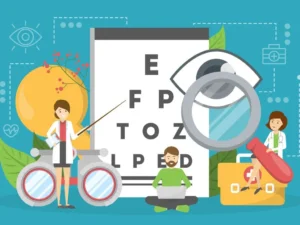Diabetes is a serious health condition that occurs when too much blood sugar, also known as glucose, is in the bloodstream. This is generally caused by the body not producing enough insulin, not producing any insulin, or not utilizing insulin properly (known as insulin sensitivity).
Nearly 30 million people (about 11% of the population) are diagnosed with diabetes in the world today and another roughly 10 million people are undiagnosed with it. Not only that, but nearly 100 million more are diagnosed with prediabetes – including roughly half of all seniors.
People that are diagnosed with diabetes are at an increased risk of high blood pressure, nerve damage, tiny blood vessels narrowing, and other heart-related problems. While these are some of the most common effects on the body, diabetes can also impact an individual’s eye health.
So, how does diabetes affect eye health?
It’s something that most people don’t think of when diagnosed with diabetes, but it’s actually one of the leading causes of blindness among 20-74 year olds. The body and all of its organs are interconnected – meaning a problem in one area could result in problems in other areas.
Let’s take a look at some of the most common eye problems that diabetics experience:
- Blurry Vision – when blood sugar is high, water fills into the eye’s natural lens and causes blurry vision. The only way to prevent it is by maintaining normal blood sugar levels.
- Cataracts – a cataract is characterized by a cloudy lens, which doesn’t allow light to refract properly. Diabetics tend to develop cataracts earlier than most non-diabetics.
- Glaucoma – diabetics have an increased chance of experiencing a dramatic increase in intraocular pressure (eye pressure). This results in damaged or abnormal blood vessels and nerves.
- Diabetic Retinopathy – when your blood sugar starts to grow out of control, it can damage the new blood vessels in the retina (back of the eye), you’ll develop diabetic retinopathy.
If you believe you’re experiencing any of the above eye problems, don’t hesitate to visit your local ophthalmologist for an eye exam. They have the tools and knowledge necessary to detect, diagnose, and treat eye issues – especially eye problems that come as a result of diabetes.
How Long Does it Take for Diabetes to Damage the Eyes?
Now that we know how diabetes damages the eyes, you’re likely asking yourself – how long does it take for diabetes to damage the eyes? Well, it largely depends on the eye condition and severity of the problem. Some conditions can develop quickly, while others might take time.
For example, blurry or wavy vision can occur suddenly if the eye swells due to excess water filling the eye’s natural lens. Once the patient starts experiencing symptoms, it could take several months for your eyes to return to normal as you continue to monitor and regulate your blood sugar.
On the other hand, diabetic retinopathy normally starts developing three to five years after diagnosis. At first, the diabetic patient won’t notice a lot of symptoms. As the disease progresses over time, symptoms will appear and the risk of vision loss becomes real.
Early Warning Signs & Symptoms of Diabetic Eye Problems
Diabetic eye disease is often present without warning signs or symptoms – especially in the early stages of development. This can make it very difficult for diabetics to detect eye disease caused by diabetes. As the disease worsens over time, symptoms become more apparent.
If you’re a diabetic, here are some common warning signs and symptoms to look out for in regards to diabetic eye disease:
- Blurred vision, wavy or distorted vision
- Frequent changes in your prescription or vision
- Black spots, dark areas in your visual field
- Vision loss or vision impairment
- Poor color vision, fading colors
- Floaters in your field of vision (dark spots, dark strings)
- Sudden flashes of light in your visual field
Much like any other eye disease or condition, early detection is extremely important. If you notice any of these symptoms, it could mean your diabetic eye disease is progressing and you shouldn’t hesitate to contact a local eye doctor to get your symptoms checked by a professional.
How to Prevent Eye Problems Caused by Diabetes
Although diabetics are at an increased chance of eye health issues – including blurry vision, cataracts, glaucoma, diabetic retinopathy, and more – that doesn’t mean all diabetics need to worry about their eye health. With proper prevention, you can preserve your vision long-term.
Let’s take a look at our most prominent prevention tips for preventing eye health problems for diabetics:
- Keep your A1C levels below the normal 5.7% – not any higher
- Keep your blood pressure levels below 140/80mmHg
- Keep your LDL levels below 100 and HDL above 50 (women) or 40 (men)
- If you smoke cigarettes, we heavily recommend quitting
- Schedule a diabetic eye exam with your local ophthalmologist
For those that are diagnosed with type 1 diabetes, plan on scheduling an eye exam within five years of your diagnosis and then once per year after that. For those that are diagnosed with type 2 diabetes, expect an eye exam immediately after diagnosis and then annually after that.
Contact Milwaukee Eye Surgeons for Immediate Assistance!
Diabetes is a disease that affects millions of people all around the world. It’s characterized by elevated blood glucose, meaning there’s an excess of sugar in the blood. If not treated properly and in a timely manner, it can have long-lasting, devastating effects on your day-to-day lifestyle.
One of those devastating effects on the body has to do with eye health. Whether it’s diabetic retinopathy, cataracts, glaucoma, diabetic macular edema, or simply blurred vision, diabetics are at an increased risk of developing eye disease or vision loss. Luckily, diabetics can lean on Milwaukee Eye Surgeons.
If you’ve been diagnosed with diabetes, have started to experience concerns regarding your eye health, and want to find effective ways of preventing or treating eye damage, then contact us today to schedule your routine eye exam. We can’t wait to help you preserve your vision for as long as possible – isn’t that what we all deserve?







